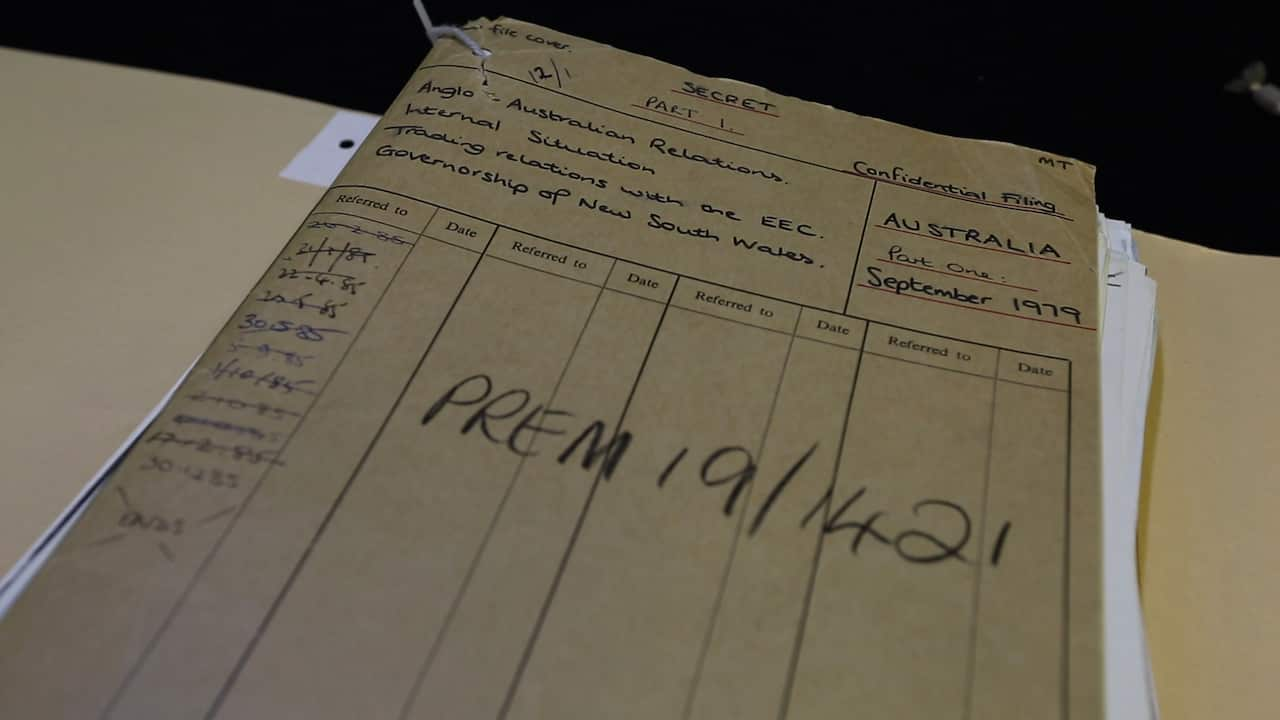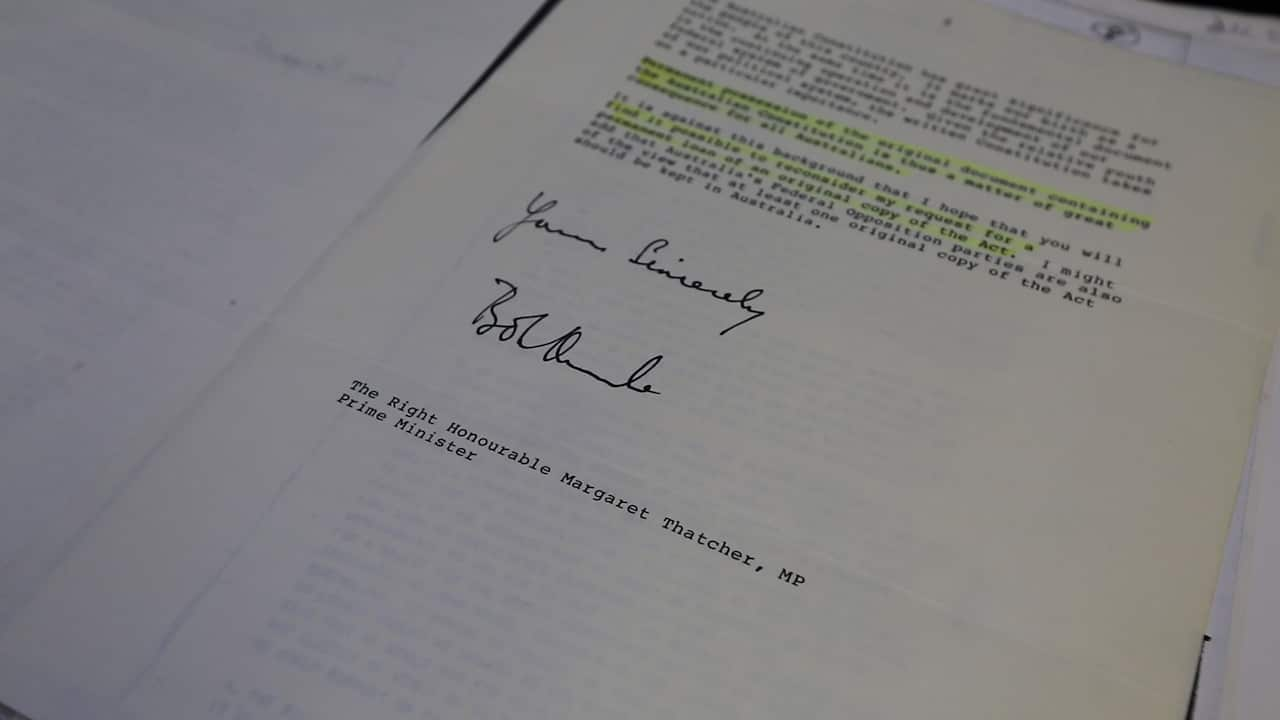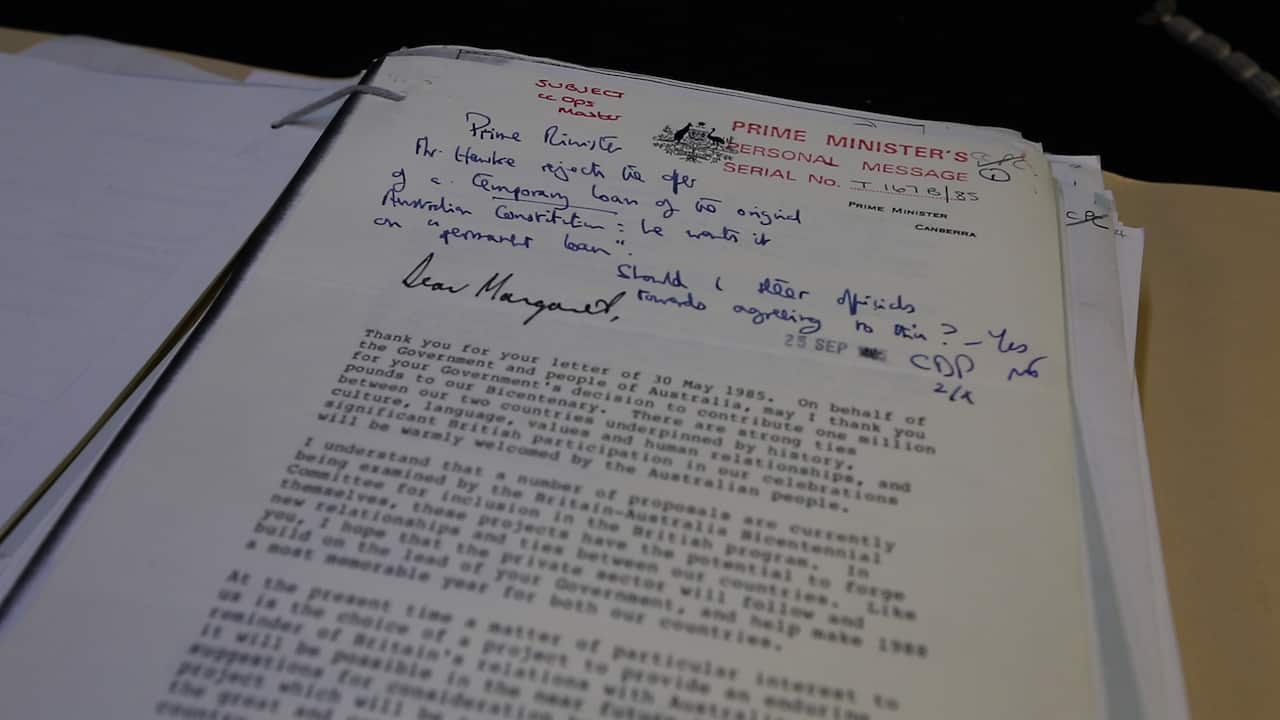"Often deliberately abrasive and even arrogant" with "a widely known weakness for drink and women" and "a studiously cultivated ‘ocker’ image".
These are the colourful words chosen by Britain’s Foreign Office to describe former Australian Prime Minister Bob Hawke to his British counterpart Margaret Thatcher.
"It’s a really interesting way of describing a Prime Minister of a foreign country," Simon Demissie from Britain’s National Archives admits.
"These assessments often tried to paint as complete a picture as possible for the Prime Minister so that she could understand and wouldn’t be surprised when someone behaved in a particular way."
"We didn’t muck around when we had a fight, Margaret and I."
The two neat manila folders, unopened since they were sealed and stored deep in the vast vaults of Britain’s National Archives in 1986, reveal the turbulent relationship between two of the biggest personalities in the Commonwealth’s political history.
When asked this week by SBS World News to describe his relationship with former British Prime Minister Margaret Thatcher, former Australian Prime Minister Bob Hawke said simply: “We had a love-hate relationship."
"We didn’t muck around when we had a fight, Margaret and I."

In her memoirs, the late British Conservative Party Leader described their "famous rows" as "bitter", which Mrs Thatcher put down to their equally “blunt” personalities.
"I think it’s fair to say a slight clash of characters and certainly of political philosophies," Mr Demissie said.
The previously secret British Government documents, seen for the first time by SBS World News, detail the Prime Ministers’ first meeting at Number 10 Downing Street in London on April 21, 1986.
Mr Hawke had attempted to meet with Mrs Thatcher on a previous visit to London three years earlier, having just been elected Prime Minister.
"Hawke is shrewd, articulate and a formidable negotiator."
Despite staying in a hotel a few blocks from Downing Street, the pair only spoke by telephone.
Ms Thatcher had called a general election after Mr Hawke's trip was scheduled, a decision labelled as a snub of a major ally by Australian media.
Given the backlash years earlier, Mrs Thatcher was given detailed briefings ahead of their afternoon tea at her official residence, including typed cue-cards with key dot points to help guide the negotiations.
"Our relationship with the Australian Government, while good, is much less close than it was in the Menzies era," Mrs Thatcher was told by the Foreign Office.
"The Australians are now more likely to seek advice in Washington than in London," the briefing continued.

A two-page character assessment noted a "normally tense" Mr Hawke was "proud of his prowess" and "used to relax over a glass of beer or almost any other beverage."
"He is shrewd, articulate and a formidable negotiator."
Despite these observations, minutes of the meeting reveal Mrs Thatcher agreed to little, if any, of what Australia sought, including the relaxing of agricultural trade policy in Europe.
Mrs Thatcher was warned by advisers that "the main purpose of Mr Hawke’s visit is to show Australians that he is out there and battling for Australia’s agricultural exports."
If those negotiations were to become tricky, Mrs Thatcher’s cue-cards suggested: "you will not want to let him forget Australia’s high tariffs on industrial products – average 24% as against Europe’s 4.9%".
Mrs Thatcher would not support Australia’s bid for a wider contribution to the G7 and G10.
Her cue cards, preserved and included in the files, read: "(Hawke) will press you to support Australia’s involvement in the Economic Summit. You will want to let him down gently."
"I never drank while I was Prime Minister - so you can throw that in the bucket."
The British Prime Minister was "sceptical" of Australia’s "unrealistic" plans for a South Pacific Nuclear Free Zone, telling Mr Hawke "you do not create a nuclear free zone simply by declaring one."
"The Soviet Union would not take the slightest notice."
The minutes note Mrs Thatcher "could give no commitment" to the Australian Government’s request for support.
"We agreed on many things but our big point of difference was the apartheid regime in South Africa," Mr Hawke told SBS.
"I led the fight in the Commonwealth against that, trying to smash it, which we would finally be successful in doing, but Margaret would never join that fight and so I had some famous stouches with her."
"She worked very, very hard so you always knew that when you had a meeting with Margaret she’d be well prepared," the former Labor Leader said.
The minutes reveal Mrs Thatcher "congratulated Mr Hawke on the success of the Australian economy" and that a large portion of their time together was devoted to what Downing Street advisers called Mr Hawke’s "hankering" for one of two original copies of the Australian Constitution to be permanently loaned to Australia to mark the nation’s bicentenary celebrations in 1988.
Mrs Thatcher refused Mr Hawke’s repeated requests, on advice that releasing the document "would set an undesirable precedent" within the Commonwealth.
"Mr Hawke expressed deep disappointment at the United Kingdom’s inability to allow Australia to have one of the two originals of the Constitution," the minutes read.
"The Prime Minister (Mrs Thatcher) acknowledged the disappointment, but pointed to the difficult precedent which would be created."

Despite leaving the 75-minute meeting empty handed, Mr Hawke would continue the fight for possession of the Australian constitution for four years, repeatedly rejecting offers of a temporary loan or replica.
In one of several letters written personally to Mrs Thatcher, Mr Hawke stressed "possession of the original document is a matter of great consequence for all Australians."
The requests created an administrative and legal nightmare for British bureaucrats.
The United Kingdom’s Public Records Act (1958) stipulates original copies of every Act of Parliament must be retained by the Government.
Mr Hawke was clearly determined and after years of negotiations, Australia finally wrestled one of the two original documents from Westminster.
After further requests to Queen Elizabeth II, in 1990 the British Parliament voted to change the law and allow the permanent loan to proceed.
The Australian Constitution (Public Record Copy) Act 1990 is now on public display at the National Archives of Australia in Canberra. A second copy of the historic document remains in Britain’s House of Lords.
As for those unflattering briefing notes prepared for "The Iron Lady" three decades ago?
"I never drank while I was Prime Minister - so you can throw that in the bucket," said a clearly unamused Mr Hawke.

